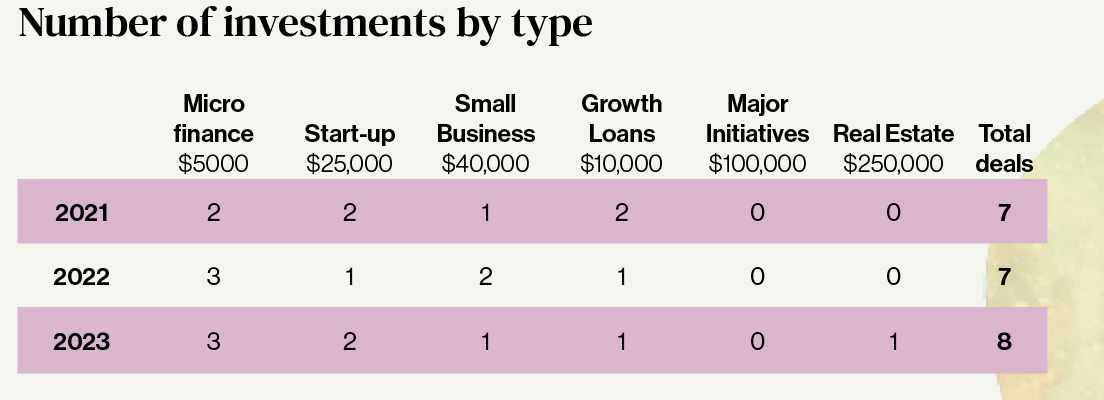
Boston Ujima Project designed the Ujima Fund to value what our people know.

The rich history of Boston’s Black, Latinx, and Indigenous communities includes institution building in the face of racism.
Honoring, reflecting, and building upon this history, Boston Ujima Project created and designed the Ujima Fund to value what our people know. What we’ve learned from our ancestors and what we continue to affirm anew. To activate this knowing, a participatory process governs the Ujima Fund - Ujima’s Voting Members, residents of the communities being invested in, direct the Ujima Fund’s investments. We are committed to a participatory process, not just because we believe democracy is a human right, but also because we believe that meaningful, community driven planning results in a more effective allocation of resources.
Our latest milestone in this community and institution building project, Ujima’s inaugural Investor Report, arrives amidst realities that are both reminiscent of conditions that our ancestors knew and an easy testament of Ujima’s relevance, and according to today’s movement elders, a deeper, unprecedented reckoning with racism and white supremacy.
The time between Ujima’s first investment vote in December 2019 and today included learnings on and reaffirmations of our businesses’ and our own flexibility, responsiveness, relationships, patience, faith, and trust.
We appreciate that you are here with us. We appreciate your patience, your faith, your trust. Now we invite you to reflect and learn with us.
— Nia K. Evans, Executive Director, Boston Ujima Project
Honoring, reflecting, and building upon this history, Boston Ujima Project created and designed the Ujima Fund to value what our people know. What we’ve learned from our ancestors and what we continue to affirm anew. To activate this knowing, a participatory process governs the Ujima Fund - Ujima’s Voting Members, residents of the communities being invested in, direct the Ujima Fund’s investments. We are committed to a participatory process, not just because we believe democracy is a human right, but also because we believe that meaningful, community driven planning results in a more effective allocation of resources.
Our latest milestone in this community and institution building project, Ujima’s inaugural Investor Report, arrives amidst realities that are both reminiscent of conditions that our ancestors knew and an easy testament of Ujima’s relevance, and according to today’s movement elders, a deeper, unprecedented reckoning with racism and white supremacy.
The time between Ujima’s first investment vote in December 2019 and today included learnings on and reaffirmations of our businesses’ and our own flexibility, responsiveness, relationships, patience, faith, and trust.
We appreciate that you are here with us. We appreciate your patience, your faith, your trust. Now we invite you to reflect and learn with us.
— Nia K. Evans, Executive Director, Boston Ujima Project
“Ujima fills a vital role in Boston’s social justice movement ecosystem: it is a gathering place for neighbors, a space to participate in Boston’s rich arts and cultural life, and a hub connecting grassroots organizations and issue campaigns. Through Ujima, communities of color have a place to co-create the new society that we are all building.”
— Lisa Owens, former Executive Director, City Life/Vida Urbana


Despite the COVID-19 pandemic, the Ujima Fund was successful in raising capital. The Fund has raised $3.5 million of its 2021 year-end target of $5 million. Nearly 60% of the $3.5 million was raised in 2020 alone.
In 2019, Ujima celebrated its very first $100,000 investment in worker-owned commercial composting company, CERO Cooperative. In 2020, Ujima also made its first allocation of unspent capital into a community-approved financial institution. Ujima deployed $100,000 in the Cooperative Fund of New England, a loan fund that finances cooperatives, community-oriented nonprofits, and worker-owned businesses.
Watch our annual Investments Report Out video here.
With the fundraising successes we saw in 2020, we are excited to begin deploying that capital back into our community.


Over the next 3 years, we project that the Fund will invest an estimated $2.8 million in small businesses and real estate. In particular, we plan to offer four types of small business loan products: microfinance loans (up to $5,000 each), start-up loans (up to $25,000 each), small business loans (up to $40,000 each), growth loans (up to $100,000 each).
We are also reserving up to $250,000 for potential real estate acquisitions, such as for a community land trust. In total, we anticipate lending to 22 small businesses and entrepreneurs by year’s end in 2023. We also plan to increase fundraising efforts in late January 2021 to continue raising capital for loan deployment.

Boston Ujima Project designed the Ujima Fund to value what our people know.

The rich history of Boston’s Black, Latinx, and Indigenous communities includes institution building in the face of racism.
Honoring, reflecting, and building upon this history, Boston Ujima Project created and designed the Ujima Fund to value what our people know. What we’ve learned from our ancestors and what we continue to affirm anew. To activate this knowing, a participatory process governs the Ujima Fund - Ujima’s Voting Members, residents of the communities being invested in, direct the Ujima Fund’s investments. We are committed to a participatory process, not just because we believe democracy is a human right, but also because we believe that meaningful, community driven planning results in a more effective allocation of resources.
Our latest milestone in this community and institution building project, Ujima’s inaugural Investor Report, arrives amidst realities that are both reminiscent of conditions that our ancestors knew and an easy testament of Ujima’s relevance, and according to today’s movement elders, a deeper, unprecedented reckoning with racism and white supremacy.
The time between Ujima’s first investment vote in December 2019 and today included learnings on and reaffirmations of our businesses’ and our own flexibility, responsiveness, relationships, patience, faith, and trust.
We appreciate that you are here with us. We appreciate your patience, your faith, your trust. Now we invite you to reflect and learn with us.
— Nia K. Evans, Executive Director, Boston Ujima Project
Honoring, reflecting, and building upon this history, Boston Ujima Project created and designed the Ujima Fund to value what our people know. What we’ve learned from our ancestors and what we continue to affirm anew. To activate this knowing, a participatory process governs the Ujima Fund - Ujima’s Voting Members, residents of the communities being invested in, direct the Ujima Fund’s investments. We are committed to a participatory process, not just because we believe democracy is a human right, but also because we believe that meaningful, community driven planning results in a more effective allocation of resources.
Our latest milestone in this community and institution building project, Ujima’s inaugural Investor Report, arrives amidst realities that are both reminiscent of conditions that our ancestors knew and an easy testament of Ujima’s relevance, and according to today’s movement elders, a deeper, unprecedented reckoning with racism and white supremacy.
The time between Ujima’s first investment vote in December 2019 and today included learnings on and reaffirmations of our businesses’ and our own flexibility, responsiveness, relationships, patience, faith, and trust.
We appreciate that you are here with us. We appreciate your patience, your faith, your trust. Now we invite you to reflect and learn with us.
— Nia K. Evans, Executive Director, Boston Ujima Project
“Ujima fills a vital role in Boston’s social justice movement ecosystem: it is a gathering place for neighbors, a space to participate in Boston’s rich arts and cultural life, and a hub connecting grassroots organizations and issue campaigns. Through Ujima, communities of color have a place to co-create the new society that we are all building.”
— Lisa Owens, former Executive Director, City Life/Vida Urbana


Despite the COVID-19 pandemic, the Ujima Fund was successful in raising capital. The Fund has raised $3.5 million of its 2021 year-end target of $5 million. Nearly 60% of the $3.5 million was raised in 2020 alone.
In 2019, Ujima celebrated its very first $100,000 investment in worker-owned commercial composting company, CERO Cooperative. In 2020, Ujima also made its first allocation of unspent capital into a community-approved financial institution. Ujima deployed $100,000 in the Cooperative Fund of New England, a loan fund that finances cooperatives, community-oriented nonprofits, and worker-owned businesses.
Watch our annual Investments Report Out video here.
With the fundraising successes we saw in 2020, we are excited to begin deploying that capital back into our community.


Over the next 3 years, we project that the Fund will invest an estimated $2.8 million in small businesses and real estate. In particular, we plan to offer four types of small business loan products: microfinance loans (up to $5,000 each), start-up loans (up to $25,000 each), small business loans (up to $40,000 each), growth loans (up to $100,000 each).
We are also reserving up to $250,000 for potential real estate acquisitions, such as for a community land trust. In total, we anticipate lending to 22 small businesses and entrepreneurs by year’s end in 2023. We also plan to increase fundraising efforts in late January 2021 to continue raising capital for loan deployment.
